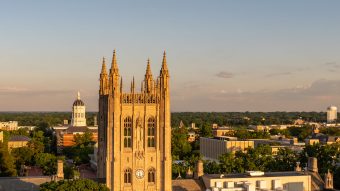
Feb. 8, 2023
Contact: Deidra Ashley, ashleyde@missouri.edu
If you’ve read the headlines lately, you might have seen stories about ChatGPT or DALL·E, two open artificial intelligence (AI) tools available to the public. What you might not realize, though, is the same core technology used in these often fun and playful tools is also advancing medical science.
University of Missouri doctoral student Alex Morehead came to Mizzou to study with world-renowned AI researcher Jianlin “Jack” Cheng, William and Nancy Thompson Distinguished Professor in the Department of Electrical Engineering and Computer Science. Morehead, a St. Joseph, Missouri, native is taking curiosity and combining it with his passion for computers to create better medical and climate outcomes. Learn more about his research and time at Mizzou.
What is bioinformatics and how does it impact the world?
Bioinformatics is a discipline that combines biology and computer science. The cool thing about bioinformatics is that it can have some really nice — and quick — real-world impacts.
One example is modern day drug discovery. When you automate the most tedious parts of the research process, it can help move the investigation along more quickly. With drug discovery, instead of spending, say, a year to run physical experiments and analyze data, you’re seeing that time go down to a period of a few months.
That’s just one example of how this type of work is helping create better health outcomes for people around the world.
Tell us about your research.
My research interests include machine learning, deep learning, computational biology and high-performance computing. My current research is structured prediction in machine learning. Basically, building advanced AI software that helps us get down into the fine details of biology while analyzing different types of data. It can have a lot of medical applications and can even be used in energy research for climate change, too.
How has your relationship with your mentor affected your Mizzou experience?
The high-impact research Dr. Cheng and his lab are working on is one of the main reasons I decided to come to Mizzou. Dr. Cheng is a fantastic advisor, not just in terms of credentials, but his keen insight to be able to look ahead and anticipate problems and trends.
As a PhD, you’re going to make mistakes as you learn and try new things. Dr. Cheng gives you the freedom to make those failures, but he’s always there to help you figure it out when you get stuck. He doesn’t care if it takes you a year to get one important problem done as long as you’re growing as a scientist. He has a lot of roles and wears a lot of hats, and I’ve enjoyed getting to work with him and to better understand what drives him as a researcher.
What are you most proud of so far from your time at Mizzou?
I’ve accomplished a lot of great things at Mizzou, but one of the moments that stands out is being a part of Dr. Cheng’s team at last year’s CASP Protein Prediction Competition. Nearly 100 research groups from all over the world were competing to advance the field of protein modeling and prediction. Mizzou’s team placed first in one of the categories and ranked in the top 10 in four different categories.
We had a great team, and everyone put in 110% throughout the entire summer semester to work on the various projects associated with the competition. Getting to say I played a small part in the success of our larger team makes me proud. Not only was it a whole new level of research, but we were also evaluating and creating solutions for real-world problems.
What’s next for AI?
AI is already helping solve important scientific problems, and that’s only going to continue to grow — I feel like a lot is going to change even in the next two years. The future of AI will show us more medical advancements and even breakthroughs in energy research for climate change and things like that. In an even broader sense, I believe AI is increasingly beginning to beg the question: What exactly do we mean by intelligence? The number of answers to this question is seemingly endless, and that’s actually one of the reasons I am excited and grateful to be working in this field.



